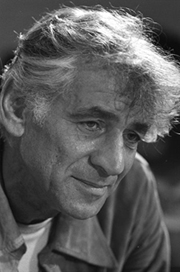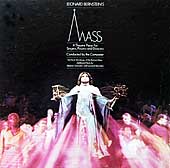
Lenny B., American Idol
This week the San Francisco Symphony puts on an all-Bernstein concert, featuring the wonderful Dawn Upshaw. Here's a link to my article about the concert and its program, and here's another to the SF Symphony's web page on the concert. After this week the SFS will take the show briefly on the road.
 I've been spending some time of late listening to Bernstein, courtesy of Sony Classical's recent release of the "Original Jacket" set of Bernstein conducting Bernstein.
I've been spending some time of late listening to Bernstein, courtesy of Sony Classical's recent release of the "Original Jacket" set of Bernstein conducting Bernstein.
It's quite an impressive collection, encompassing virtually all the Lenny/New York Phil records on Columbia Masterworks that I remember so vividly from my youth, when the Columbia Record Club was my primary lifeline to that dazzling Music Land so impossibly far over the horizon (it seemed) from the squeaky-clean suburbs that made up my safe-but-narrow world.
The Original Jacket series socks it to you in spades. The symphonies (No. 1 "Jeremiah", two versions of No. 2 "The Age of Anxiety", and that weirdly compelling train wreck "Kaddish" No. 3) make up three full discs.
"On the Town" struts nimbly across two discs, one set being the orchestral dances and the other being Lenny's rowdy rendition with originals Betty Comden, Adolph Green, Cris Alexander, and Nancy Walker.
We get two different performances of the early ballet "Fancy Free"; we get hausfrau opera "Trouble in Tahiti", we get rara avis ballet "Dybbuk" written for Jerome Robbins. We get various thisses 'n' thats — choral pieces, the Candide overture, orchestral music from both West Side Story and On the Waterfront, stuff for Benny Goodman, a few other things.
We also get that super-hyped, super-sized, underwhelming "Mass" of 1971. Yecch. I was a senior in high school when it premiered, and by the time I arrived at Peabody in 1972, it was already known as Mess and served as the butt of endless catty jokes.
Mess was supposed to be Lenny's valediction, the once-and-for-all magisterial statement for which everybody and his dog had been waiting, the Big Thing that was to put him back on the map as the Great American Composer, finally, after his long stint at the helm of the NY Phil where he had educated an entire generation of suburban kids like me via CBS TV.
But it flopped, and with good reason: the thing's horrid.
 I tried to get through it again in this newly remastered CD of the original. I tried, really I did. Tummy got upset. Jaw started clinching. Irritation bubbled, threatened to erupt. Stereo set got turned off. Professor Foglesong whimpered Oh, sheesh, it's even worse than I remembered, then retired to the kitchen to pour himself a restorative.
I tried to get through it again in this newly remastered CD of the original. I tried, really I did. Tummy got upset. Jaw started clinching. Irritation bubbled, threatened to erupt. Stereo set got turned off. Professor Foglesong whimpered Oh, sheesh, it's even worse than I remembered, then retired to the kitchen to pour himself a restorative.
The flower-child anthem "A Simple Song" has eeked out a musty living, but its treacly sincerity sits as poorly as does its stained-tie-dye-and-stinky-sandals gestalt. I can just feel my hair sprouting, granny glasses protruding from the bridge of my nose, dark lights flickering out of limbo and fluorescing long-posthumous Age of Aquarius posters, lava lamps resuming their bubbly heaving while whiffs of Shankar mingle with other, more illicit whiffs.
In short, it summons back all that crap that we stupid kids thought was cool back then. But let's tell it for what it was — just fashion, nothing more. Trends, fads and gimmicks. As of today I hear there's some hullaballo about plastic footwear. Back then it was Indian cotton. So it goes.
And that's the problem with Bernstein's concert music. It hasn't worn well, not a bit. "West Side Story" will probably remain an icon of American music until Doomsday, but the rest? Curios left behind when the culture moved on to the next hot thing.
Bernstein's earlier stuff was so stiffly laced with Copland-isms that one wonders why Copland didn't protest, or sue.
Much of the later music is soddenly pretentious — such as the symphonies, in particular No. 3 "Kaddish" brandishing its oh-so-earnest dedication to the assassinated JFK, taking itself seriously to the point of self-parody. "Trouble in Tahiti" blathers tiresomely, "Dybbuk" earns its obscurity.
Once in a while gems such as Chichester Psalms remind you how well Bernstein really could write, not just only when Broadway spotlights blinded him to his pompous self-portrait as American Master.
That said, I'm cautiously optimistic about Bernstein's ultimate legacy, even if he really wasn't much as a "serious" American composer. He was, however, a conductor of lasting influence, probably the greatest music communicator and mass-audience teacher of all time, and definitely an all-around musician of incomparable skill.
Furthermore, the guy really knew how to live and did us all a good deed by helping to retire that threadbare image of the Great Musician as bitchy old European guy.
More and more I wonder if he might come to hold a place in history similar to the 19th-century Ignaz Moscheles, a musician of comparable skill and range — composer, pianist, conductor, teacher, commentator. Moscheles isn't on anybody's short list as a great composer, but he was one of those cherished few who truly dignified a profession all too often characterized by marginal personalities, overweening puffery, and questionable intellects.
Considering Lenny's incomparable achievements in so many of his endeavors, I'm inclined to forgive him for the Mass. Nevertheless, it will be a cold day in you-know-where before I subject myself again to its nauseating bombast.
